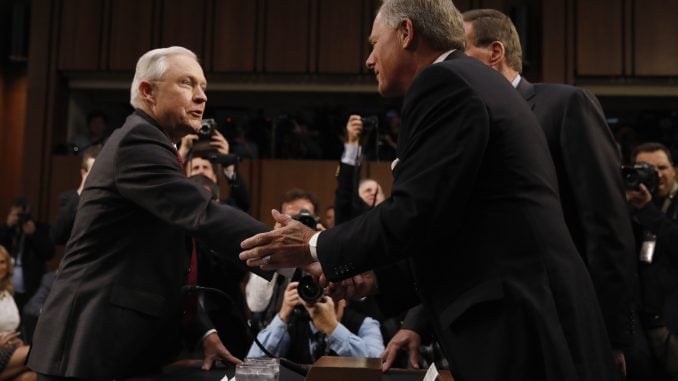
WASHINGTON, D.C. U.S. Attorney General Jeff Sessions, appearing at a high-stakes Senate hearing on Tuesday, called accusations that he colluded with Russian meddling in the 2016 presidential campaign “an appalling and detestable lie.”Sessions testified about his dealings with Russian officials and commented on concerns following the testimony of former FBI Director James Comey on Thursday.”I have never met with or had any conversation with any Russians or any foreign officials concerning any type of interference with any campaign or election in the United States,” Sessions told the Senate Intelligence Committee. “Further, I have no knowledge of any such conversations by anyone connected with the Trump campaign.”The suggestion that I participated in any collusion or that I was aware of any collusion with the Russian government to hurt this country, which I have served with honor for over 35 years, or to undermine the integrity of our democratic process, is an appalling and detestable lie,” he added.Committee chairman Sen. Richard Burr (R-N.C.) told Sessions that the hearing was an “opportunity to separate fact from fiction” and “set the record straight on a number of allegations reported in the press.”Comey testified last week before the same panel, revealing that President Donald Trump was never under investigation for involvement with Russian interference in the election, and that he had personally notified Trump of this fact in January. He called several media reports that linked the Trump campaign with Russia “dead wrong.”Sessions also revealed on Tuesday that he had not even been briefed on the criminal investigation prior to his recusal. “I was sworn in as attorney general on Thursday, Feb 9,” said Sessions. “The very next day … I met with career Department [of Justice] officials, including a senior ethics official, to discuss some things publicly reported in the press that might have some bearing on whether I should recuse myself in this case. From that point, Feb. 10, to my formal recusal on March 2, I was never briefed on any investigative details and did not have any access to the investigation.”As such, I have no knowledge of this investigation as it is ongoing today,” continued Sessions, testifying that he also has had no interaction with Robert Mueller since he was appointed as special prosecutor for the case, other than a mass email sent to DOJ employees to announce his recusal. Comey testified last week that while the president never asked him outright to stop the Russian investigation, he believes he was fired for his conduct involving the case. On Tuesday, Sessions pointed instead to dissatisfaction with Comey’s performance as head of the FBI and links to high-profile leaks as the momentum behind his recommendation to let him go. “We both agreed that a fresh start at the FBI was probably the best thing,” he recalled about his discussions with Deputy Attorney General Rod Rosenstein. “We need to restore … the classic discipline in the department,” Sessions said in response to a probe from Sen. Susan Collins (R-Maine). “There’s been too much leaking and too much talking publicly about investigations.”Sessions disclosed that he never addressed these concerns with Comey prior to sending a letter to the president on May 9 to recommend Comey’s dismissal. When addressed with a question of why he involved himself in the firing, despite having recused himself from all Russia-related cases, Sessions replied that “it did not violate my recusal.”The attorney general defended his “professional” interactions with Russian officials both before and after the election, and pointed to a DOJ regulation as justification for his decision to recuse himself from the Russia investigation.”I recuse myself, not because of any asserted wrongdoing … but because a Department of Justice regulation, I felt, required it,” explained Sessions. Holding up a piece of paper, Sessions said, “Department employees should not participate in investigations of a campaign, if they served as a campaign adviser.”My recusal does not and cannot interfere with my ability to oversee the Department of Justice,” he added. Sessions, a former senator from Alabama and an early supporter of Trump’s election campaign, is the most senior government official to testify to the committee on the Russia issue. Sessions refused to answer questions on more intimate conversations with the president, stating “it’s a longstanding policy in the Department of Justice not to comment on conversations that the attorney general has had with the president of the United States.” When asked directly, Sessions avoided ever calling it executive privilege. During the hearing, Sen. Tom Cotton (R-Ark.) stressed Comey’s testimony that the president was not under investigation, and called any theories that Trump and the attorney general were involved in a Russian collusion an “elaborate plotline” that you’d see in a James Bond or Jason Bourne movie, but not reality. Russia has denied interfering in the U.S. election.Julia Edwards Ainsley and Patricia Zengerle from Reuters contributed to this article.



